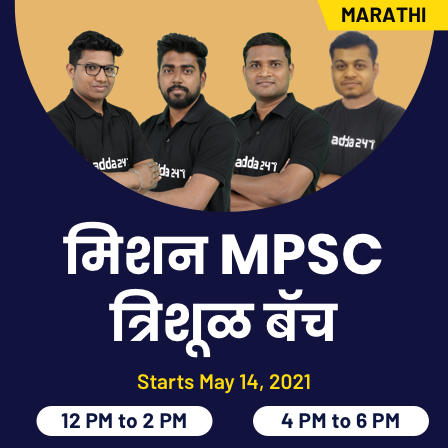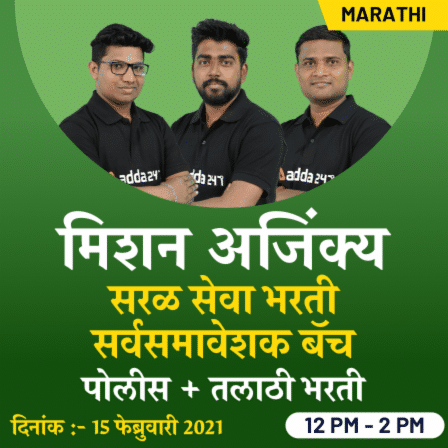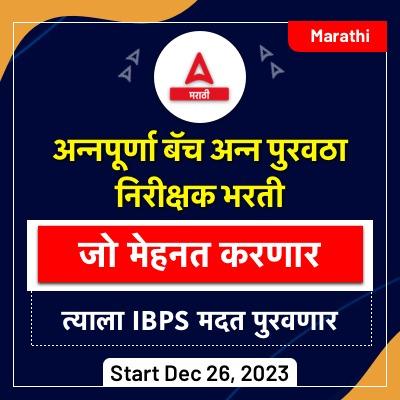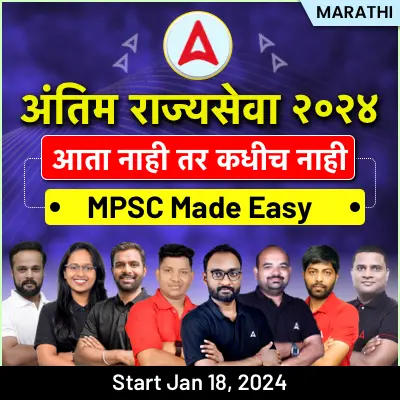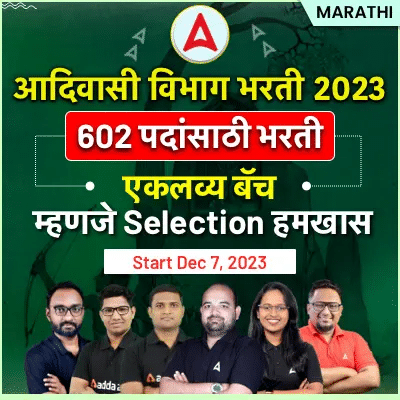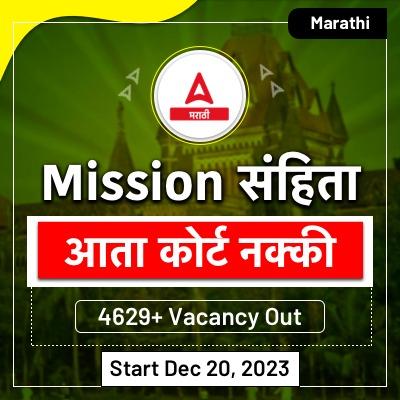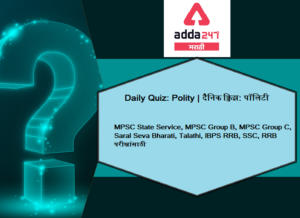
पॉलिटी दैनिक क्विझ मराठीमध्ये: 15 मे 2021
महाराष्ट्र राज्य लोकसेवा आयोग दरवर्षी वेगवेगळ्या परीक्षे मार्फत हजारो विद्यार्थ्यांची भरती करून घेते MPSC State Service, MPSC Group B, MPSC Group C, Saral Seva Bharati, Talathi, UPSC, SSC, RRB अशा अनेक परीक्षांमार्फत हजारो जागांची भरती दरवर्षी निघते ज्यात लाखो इच्छुक हजार किंवा त्याहूनही कमी जागांसाठी अर्ज करतात. आपण एमपीएससी आणि इतर परीक्षाची तयारी करत असाल तर आपल्याला क्विझ देण्याचे महत्त्व माहित असलेच पाहिजे. बर्याच विद्यार्थ्यांना अभ्यासाचे पुरेसे तास दिले जात असतानाही त्यांना या परीक्षांची पूर्तताही करता आली नाही कारण ते त्यांचे परीक्षण वेळेवर पूर्ण करू शकत नाहीत आणि संशोधन करण्याचा उत्तम मार्ग म्हणजे त्या संबंधित विषयाची किंवा विषयाची क्विझ देणे कारण आपण या मार्गाने कव्हर करू शकता कमी वेळात जास्तीत जास्त विषय. आम्हाला Add 247 मराठी येथे चांगल्या अभ्यास सामग्रीचे मूल्य समजले आहे आणि म्हणूनच आम्ही सर्व विषयांसाठी आपल्याला क्विझ प्रदान करीत आहोत. दैनिक क्विझ देऊन तुम्ही तुमच्या तयारीची पातळी तपासू शकता.
चालू घडामोडी, भूगोल, अर्थशास्त्र, पर्यावरण, सामान्य विज्ञान, इतिहास, पॉलिटी अशा सर्व स्पर्धात्मक सामान्य अभ्यास विषयांमध्ये पॉलिटीचाही तेव्हडाच महत्वाचा वाटा आहे. तर चला पॉलिटी बद्दल तुमची तयारी तपासण्यासाठी खालील 15 मे 2021 ची पॉलिटीची दैनिक क्विझ पहा.
Q1.पुढील विधानांचा विचार करा
1. सनदी कायदा 1813 ने संचालक कोर्टाचे कामकाज मर्यादित केले.
2. पिटस इंडिया कायद्याने प्रथमच कंपनीच्या नागरी-लष्करी महसूल आणि राजकीय व्यवहार व्यवस्थापित
करण्यासाठी नियंत्रण मंडळ तयार केले.
3. 1973 च्या अधिनियमानुसार, आवश्यक खर्चाचे वेतन आणि व्याज देयके बाजूला ठेवून परिस्थितीत कंपनीकडून
अशी मागणी केल्यास क्राउन संरक्षणासाठी संपूर्ण महसूल लागू करण्याचा आदेश देऊ शकतो.
वर दिलेली कोणती विधाने बरोबर आहेत?
(a) 1,2
(b) 2,3
(c) फक्त 1
(d) 1,2,3
Q2. राष्ट्रीय मानवाधिकार आयोग अधिनियम 1993 नुसार खालीलपैकी कोण अध्यक्ष होऊ शकेल?
(a) सर्वोच्च न्यायालयाचा कोणताही सेवारत न्यायाधीश
(b) उच्च न्यायालयाचा कोणताही सेवारत न्यायाधीश
(c) फक्त निवृत्त मुख्य भारताचे सरन्यायाधीश
(d) केवळ उच्च न्यायालयाचे निवृत्त मुख्य न्यायाधीश
Q3.पुढील विधानांचा विचार करा
1. अनुच्छेद 3 संसदेस विद्यमान राज्याचे नाव, क्षेत्र किंवा सीमा बदलण्याचे आणि राज्याच्या संमतीविनाही
नवीन राज्य बनविण्यास सामर्थ्य देते.
2. समवर्ती यादी किंवा राज्य यादीमध्ये नमूद केलेल्या कोणत्याही गोष्टीसंदर्भात कोणताही कायदा करण्यास
भारतीय संसदेस विशेष अधिकार आहे.
वर दिलेली कोणती विधाने बरोबर आहेत?
(a) फक्त 1
(b) फक्त 2
(c) दोन्ही 1 आणि 2
(d) 1 किंवा 2 देखील नाही
Q4. पुढील विधानांचा विचार करा
1. सभागृह नेते आणि विरोधी पक्षनेते यांच्या कार्यालयाचा उल्लेख भारतीय राज्यघटनेत केलेला नाही परंतु ते संसदीय अधिवेशनांवर आधारित आहेत.
2. 1977 मध्ये लोकसभा आणि राज्यसभेतील विरोधी पक्षनेत्याला वैधानिक मान्यता देण्यात आली.
3. राज्यसभेत, एखाद्या पक्षाकडे किमान 55 सभासद नसल्यास, त्याच्या नेत्याला विरोधी पक्षनेते म्हणून मान्यता
दिली जाऊ शकत नाही.
वर दिलेली कोणती विधाने बरोबर आहेत?
(a) 1 आणि 3
(b) फक्त 3
(c) 2 आणि 3
(d) फक्त 2
Q5. पुढील विधानांचा विचार करा
1. 42 व्या घटना दुरुस्तीने राज्यघटनेत नवव्या परिशिष्ठाची भर केली.
2. राज्य धोरणाच्या कोणत्याही निर्देशात्मक तत्त्वांना बल देण्यासाठी सरकार नवव्या वेळापत्रकात कोणताही
कायदा ठेवू शकते.
3. 17 व्या दुरुस्ती कायद्यात नवव्या परिशिष्ठात तरतूद जोडली गेली की एखाद्या व्यक्तीने त्याच्या स्वत: च्या
शेतीखाली घेतलेल्या जमीन अधिग्रहणासाठी नुकसान भरपाईचा हक्क आणि जमीन वैधानिक मर्यादेत आहे..
वर दिलेली कोणती विधाने बरोबर आहेत?
a) 1 आणि 2
b) 2 आणि 3
c) फक्त 2
d) फक्त 3
Q6. भारतीय राष्ट्रपतींनी एखाद्या विशिष्ट राज्या संदर्भात राज्यघटनेच्या कलम 356 नुसार आपल्या अधिकारांचा उपयोग केला असेल तर
(a) संसदेने त्यास मागे घेण्यासंदर्भात ठराव संमत केला असता अध्यक्षांनी त्यास मागे घ्यावे.
(b) राज्याचे मुख्य सचिव राष्ट्रपतींच्या वतीने राज्य प्रशासनाची जबाबदारी सांभाळतात
(c) राज्य विधानसभेसह राज्यात संसदेला प्रशासनाचे समान आणि समान अधिकार प्राप्त होतात
(d) अध्यक्ष राज्य विधानसभा विरघळवू किंवा निलंबित करू शकतात
Q7. शिक्षण हक्क कायद्याबाबत खालील विधानांचा विचार करा
1. शिक्षण हक्क कायदा 1 एप्रिल 2010 रोजी लागू झाला
2. आरटीई कायद्यांतर्गत ठरविलेल्या अनिवार्य वयापेक्षा सहा वर्षांखालील विद्यार्थ्यांपैकी 20% पेक्षा जास्त विद्यार्थी वयाने मोठे आहेत.
3. आरटीई कायदा 2019 नुसार, राज्यांनी मुलाला पाचवी व आठवीच्या वर्गात अनुत्तीर्ण झाल्यास त्याला थांबवू नये.
वर दिलेली कोणती विधाने बरोबर आहेत?
a) फक्त 3
b) 1 आणि 2
c) 2 आणि 3
d) फक्त 2
Q8. लोकसभेच्या सभापतींविषयी खालील विधानांचा विचार करा
1. जेव्हा सभापतींना काढून टाकण्याचा ठराव सभागृहाच्या विचाराधीन असेल, तेव्हा तो सभागृहात अध्यक्ष
असतांना मतदान करू शकत नाही,जरी तो उपस्थित असेल.
2. भारतीय राज्यघटनेने असे म्हटले आहे की जर, कोणत्याही सदस्याचे आचरण अत्यंत उच्छृंखल असेल तर
सभापती अशा सदस्याला ताबडतोब सभागृहातून माघार घेण्यास सांगू शकेल आणि ज्या सदस्याने कोणताही
सभासद मागे घेण्याचा आदेश दिला असेल तर तो त्वरितच करेल आणि दिवसाच्या उर्वरित दिवसात अनुपस्थित
राहील.
वर दिलेली कोणती विधाने बरोबर नाहीत?
(a) फक्त 1
(b) फक्त 2
(c) वरील दोन्ही
(d) वरीलपैकी काहीही नाही
Q9. धन विधेयक बाबत, खालीलपैकी कोणती विधाने बरोबर नाहीत?
(a) त्यामध्ये भारतीय एकत्रित निधी खात्यावरील पैसे किंवा संघ किंवा राज्याद्वारे भारताच्या सार्वजनिक खात्यावर पैसे जमा करणे समाविष्ट आहे
(b) केंद्र सरकारने पैसे उधार घेण्याचे नियमन
(c) कोणताही कर लादणे, रद्द करणे, माफी, बदल किंवा नियमन
(d) स्थानिक उद्देशाने किंवा स्थानिक प्राधिकरणाद्वारा कोणताही कर लादणे, रद्द करणे, माफी, फेरबदल किंवा नियमन करणे
Q10. भारतीय राष्ट्रपती पदाच्या निवडणुकीच्या संदर्भात पुढील विधानांचा विचार करा:
1. अध्यक्ष म्हणून एखाद्या व्यक्तीच्या निवडणुकीस असे आव्हान दिले जाऊ शकत नाही की निवड शिफारस समितीच्या
सदस्यांमध्ये रिक्त पदांचे अस्तित्व आहे.
2. कोणत्याही न्यायालयानं राष्ट्राध्यक्षांना शून्य घोषित केले आहे, अशा घोषणेच्या तारखेपूर्वी त्यांनी केलेली कृत्ये अवैध ठरली जात नाहीत आणि ती अंमलात राहतात.
3. प्रत्येक खासदार किंवा आमदाराचे मतमोजणी करताना जनगणना २००१ ची लोकसंख्या बेस वापरली जाते.
वर दिलेली कोणती विधाने बरोबर आहेत?
(a) 1 आणि 2
(b) 2 आणि 3
(c) फक्त 3
(d) केवळ 1
Solutions
S1.Ans.(b)
Sol.
Statement 1 is incorrect
As Pitt’s India act made the court of Directors was restricted to commercial functions
Not the Charter Act of 1833.
Statement 2 is correct
Pitt’s India act 1784 succeded 1773 regulating act.
Features of this act were as follows-
Pitt’s India act restricted the court of directors to commercial functions as it was done
earlier but it created a new body called a board of control to managed civil-military
revenue and political affairs of the company for the first time and hence this Act gave
the British govt supreme Control over Company’s affairs for the first time.
Statement 3 is correct
Charter Act 1793-
A provision in the Charter act of 1793 was made that the company, after paying the
necessary expenses, interest, dividends, salaries, etc from the Indian Revenues will
pay 5 Lakh British pounds annually out of the surplus revenue to the British
Government. However, the act also had a provision, that the Crown could order the
application of the whole of the revenue for defense if the circumstances posed such
demands. Act of 1793 also renewed the company’s commercial privileges for the next
10 years.
S2.Ans.(c)
Sol.
According to NHRC Act 1993, only a retired CJI can become chairman of NHRC,
appointed by President on the recommendation of a committee comprising of PM,
Speaker of Lok Sabha, Home Minister, Leader of Opposition of both Houses of
Parliament, and Deputy Chairman of Rajya Sabha
S3.Ans.(c)
Sol.
Federalism is a system in which several states unite under a central authority, but are
independent in internal affairs. Certain provisions of the Indian Constitution like Article 3
(formation of new States and alteration of areas, boundaries of existing States) and
Article 248 which confers residuary powers with the Centre are violative of the federal
principle. The Constitution of India is neither purely federal nor purely unitary but is a
combination of both. Indian Constitution is quasi-federal
S4.Ans.(d)
Sol.
Statement 1 is incorrect: Though the offices of the leader of the House and the leader of
the Opposition are not mentioned in the Constitution of India, they are mentioned in the
Rules of the House and Parliamentary Statute respectively.
Statement 3 is incorrect In each House of Parliament, there is the ‘Leader of the
Opposition’. The leader of the largest Opposition party having not less than one-tenth seats
of the total strength of the House is recognized as the leader of the Opposition in that
House. This means 55 members in loksabha and 25 members in Rajya sabha
Statement 2 is correct: In a parliamentary system of government, the leader of the
opposition has a significant role to play. His main functions are to provide constructive
criticism of the policies of the government and to provide an alternative government.
Therefore, the leader of Opposition in the Lok Sabha and the Rajya Sabha were accorded
statutory recognition in 1977 by the Salaries and Allowances of Leaders of Opposition
in Parliament Act, 1977.
S5.Ans.(d)
Sol.
Only Statement 3 is correct
Statement 1 is incorrect: The ninth Schedule became a part of the Constitution in
1951 when the document was amended for the first time. It was created by the new
Article 31B, which along with 31A which saves certain classes of the acts and
regulations included in the Ninth Schedule from being challenged and invalidated on the
ground of contravention of the fundamental rights 14 and 19.
Statement 3 is correct This Article provides for the payment of compensation at market
value when the state acquires the land held by a person under his personal cultivation
and the land is within the statutory ceiling limit. This provision was added under article
31 A by the 17 th Constitutional amendment ct 1964.
Article 31C was included in the ninth schedule through the 25th amendment act of 1971
through which the government tried to give primacy to some Directive Principles of State
Policy over the Fundamental Rights
Statement 2 is incorrect in a significant judgment delivered in I.R. Coelho case18a
(2007), the Supreme Court ruled that there could not be any blanket immunity from
judicial review of laws included in the Ninth Schedule. The court held that judicial review
is a ‘basic feature’ of the constitution and it could not be taken away by putting a law
under the Ninth Schedule
S6.Ans.(d)
Sol.
During President’s rule, the state executive is dismissed and the state legislature is either
suspended or dissolved. The president administers the state through the governor which
can take the help of chief secretaries and the Parliament makes laws for the state. In brief,
the executive and legislative powers of the state are exclusively assumed by the Centre. It
is not concurrent with state assembly as it happens in a national emergency where state
assemblies are not suspended. In case of national emergency for its revocation the
loksabha can pass a resolution for its revocation and the president must revoke it but in
case of the President’s rule, there is no such provision. It can be revoked by the president
only on his own
S7.Ans.(b)
Sol.
Statement 1 is correct: In pursuance of Article 21A, the Parliament enacted the
Right of Children to Free and Compulsory Education (RTE) Act, 2009. It came into
force on 1 April 2010. This provision was added by the 86th Constitutional
Amendment Act of 2002 Article 21 A.
Statement 2 is correct –
More than 20 percent of students in Standard I are less than six, ASER 2019 reveals
— they should ideally be in pre-school. At the same time, 36 percent of students in
standard 1 are older than the RTE-mandated age of six. "Even within Standard I,
children's performance on cognitive, early language, early numeracy, and social and
emotional learning tasks is strongly related to their age. Older children do better on
all tasks," the report says.
Statement 3 is incorrect
As per the amendment, it would be left to the states to decide whether to continue
the no-detention policy. This Bill has been analyzed by a Parliamentary standing
committee, which also recommended bringing back the concept of detention in
schools. The policy has been brought back as it was felt that compelling children to
repeat a class was demotivating, often forcing them to abandon school.
The bill provides for regular examination in classes V and VIII, and if a child fails, the
amendment bill grants a provision to give her or him an additional opportunity to take
a re-examination within two months.
Such children will be provided with two-month remedial teaching to perform better in
the re-examinations.
If the students still do not pass the exam, the state government may decide to detain
them.
S8.Ans.(d)
Sol.
Statement 1 is incorrect: The resolution for the removal of the speaker of loksabha
can be initiated as well as passed only in loksabha. He can be removed only by a
resolution passed by the Lok Sabha by a special majority (ie, a majority of all the then
members of the House). But before starting any such proceedings an advance notice
of 14 days must be given to the speaker of the house. This motion of removal can be
considered and discussed only when it has the support of at least 50 members. When
a resolution for the removal of the Speaker is under consideration of the House, he
cannot preside at the sitting of the House, though he may be present. However, he can
speak and take part in the proceedings of the House at such a time and vote in the first
instance, though not in the case of an equality of votes.
Statement 2 is incorrect: Rule Number 373 of the Rules of Procedure and Conduct of
Business says: “The Speaker, it is of the opinion that the conduct of any Member is
grossly disorderly, may direct such Member to withdraw immediately from the House,
and any Member so ordered to withdraw shall do so forthwith and shall remain absent
during the remainder of the day’s sitting.” So the constitution of India does no provides
this provision
S9.Ans.(d)
Sol.
Statement (d) is incorrect:
A bill is not to be deemed to be a money bill by reason only that it provides for:
1) the imposition of fines or other pecuniary penalties, or
2) the demand or payment of fees for licenses or fees for services rendered; or
3) the imposition, abolition, remission, alteration, or regulation of any tax by any local
authority or body for local purposes
S10.Ans.(d)
Sol.
Statement 1 is correct: All doubts and disputes in connection with the election of the
President are inquired into and decided by the Supreme Court whose decision is final. The
election of a person as President cannot be challenged on the ground that the electoral
college was incomplete (ie, the existence of any vacancy among the members of the
electoral college).
Statement 2 is incorrect: President is declared void by the Supreme Court (Not any
court), acts done by him before the date of such declaration are not invalidated and
continue to remain in force
Statement 3 is incorrect: While counting the vote value of each MP or MLA the population
base of census 1971 (not 2001) is used.

